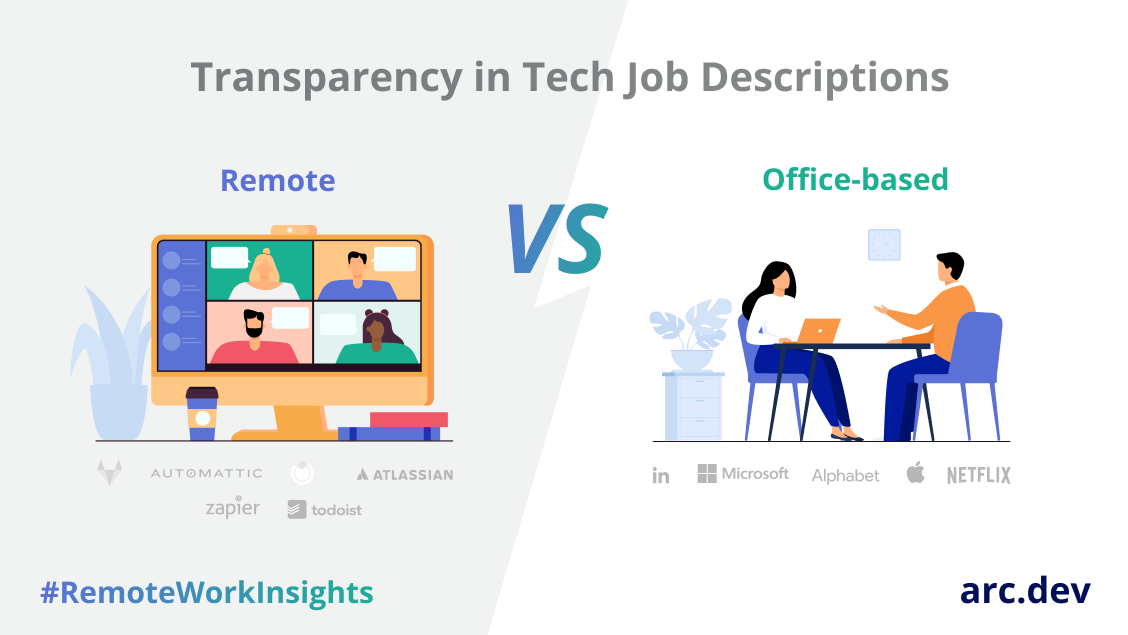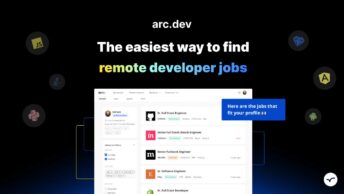As remote work becomes the norm and companies vie for top talent, it is vital for organizations to adopt recruitment best practices to stay competitive.
It means being transparent about salary, benefits, and the hiring process before a candidate even applies for a job.
Looking for top talent fast? See how Arc can help you:
⚡️ Find developers, designers, marketers, and more
⚡️ Freelance or full-time remote + fully vetted
⚡️ Save up to 80% with global hires
Hire top talent with Arc risk-free →
Remote Companies are Trailblazing Transparency in Tech Hiring
Tech companies working remotely are more transparent compared to office-based* tech companies in their recruiting, according to recent research by Arc. A manual analysis of 50 software developer job adverts showed that remote tech companies are more likely to share salary information, hiring process, and benefits and perks.
While none of the office-based companies, including tech giants Netflix, Apple, Microsoft, LinkedIn, and Alphabet shared compensation or hiring process details in their job descriptions — 20% and 44% of top remote tech companies shared the respective information. 32% of on-site tech companies and 80% of remote tech companies mentioned benefits and perks offered.
The remote companies included Automattic, the company behind WordPress; Atlassian, known for software development tool JIRA; Wikimedia, which owns Wikipedia; Doist, the company behind Todoist; and Zapier.
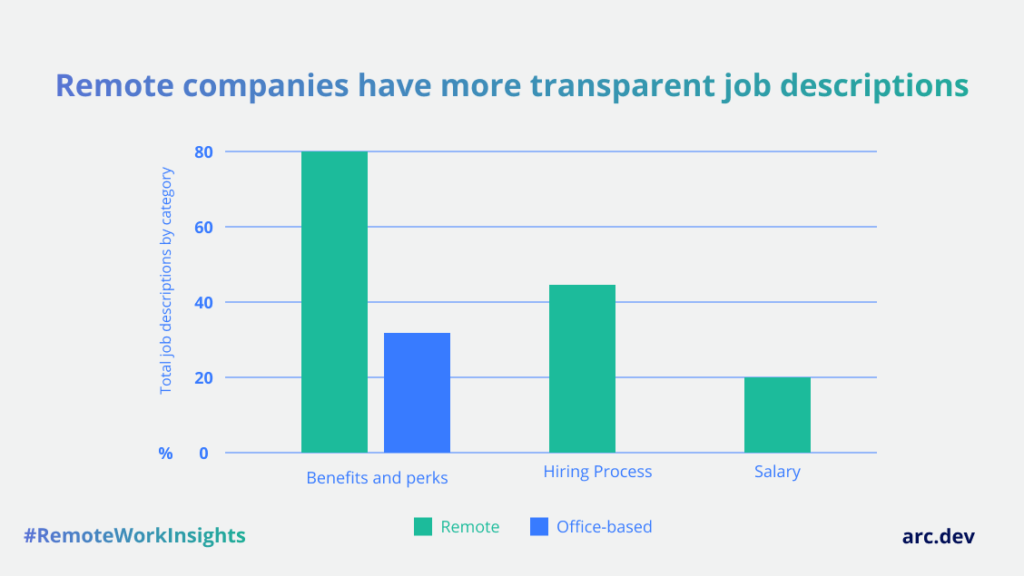
This new generation of tech companies that once trailblazed remote (and hybrid-remote) work is now revolutionizing transparency in recruiting. Buffer, which publicly released the salaries of all its employees first in 2013, is its most prominent example. Buffer’s salary calculator, Gitlab’s recruitment process, and Remote.com’s Benefits and Perks Handbook are all publicly available. The fully remote or remote-first companies are some of the most transparent in the world.
Buffer’s reason for the radical approach was to live up to its company values, which include defaulting to transparency. If not managed well, remote work can lead to information silos and a lack of work visibility. Hence, in their day-to-day work processes, most remote companies favor working transparently.
Some remote companies such as Glitch decided to share salary ranges in the job descriptions so that they can pay everyone fairly. Their commitment to diversity and inclusion shapes the priorities when they write the job descriptions.
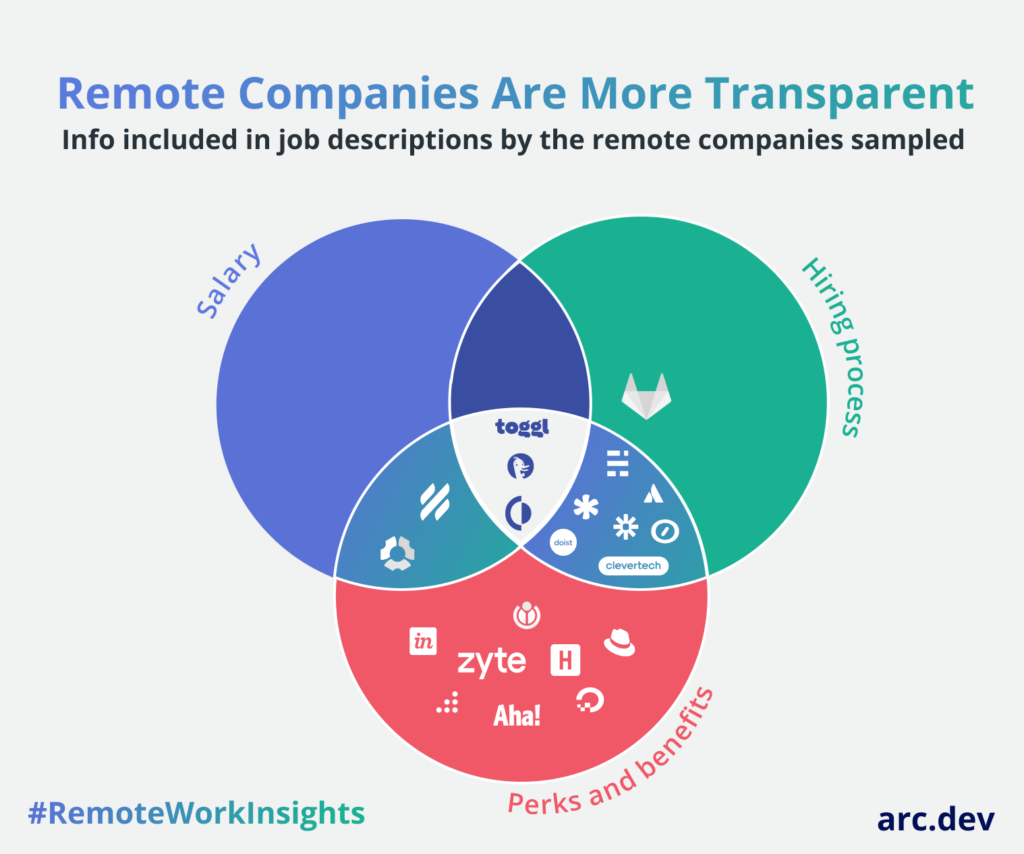
The Shifting Power Balance
This year, a fundamental shift happened — the demand for quality talent overtook supply. 2021 has seen the hottest job market since the dot-com era, especially for tech workers. Global VC funding hit an all-time high.
Companies, big and small, continued to be impacted. Employees left FAANG companies for startups flush with funds, because they were attracted to making an impact at a smaller company, or to escape the stigma associated with big tech infamous for its privacy issues. The pandemic made people reconsider their priorities. Employees want to work with organizations where they feel valued, have a sense of belonging, and where they have the potential for advancement.
With companies across the world vying for the top in-demand talent, some companies are embracing public transparency to have a competitive advantage in recruiting. Salary and benefits are the top two factors job seekers look for in ads, a Glassdoor study showed. Buffer received twice the amount of job applications in the month after making its salaries public.
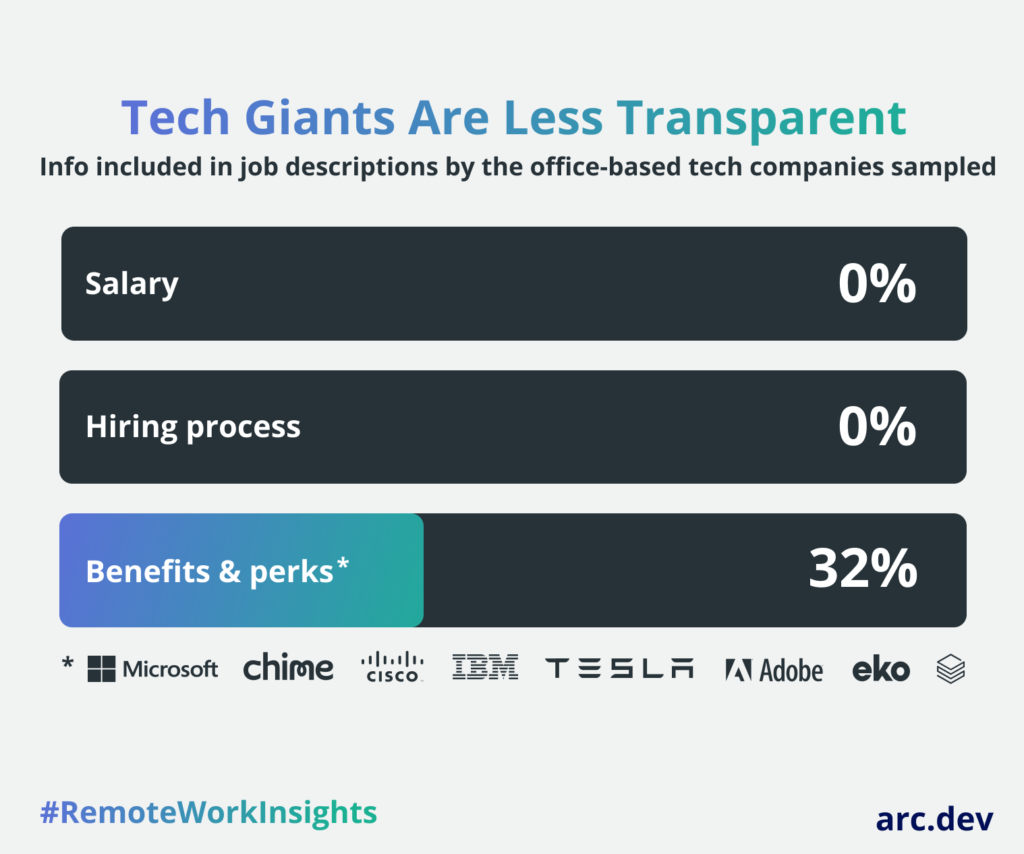
Nearly 80% of workers want to work for a company that values diversity, equity, and inclusion, a CNBC survey revealed. Hence corporations’ commitment to DEI via pay transparency can also boost employer brand.
Overcoming the resistance to adapt is worth it for companies to attract high-performing employees because research suggests that high performers are 400% more productive than average ones.
If recruiters are concerned the packages and the processes are not attractive enough to disclose, then businesses have a bigger problem. Even then, as this example from SpaceX indicates, it is better for companies to be upfront than deal with attrition later — or go through the hiring process only to be turned down.
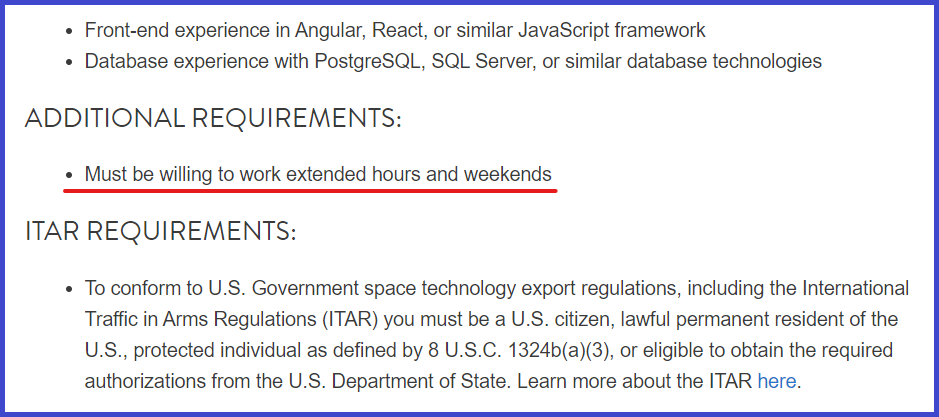
Business leaders can no longer ignore the wave of change driven by record-high VC money, remote work, and a value shift among employees. Hence, companies must take transparency seriously to compete for top talent in the changing world of work.
You can also try Arc, your shortcut to the world’s best remote talent:
⚡️ Access 450,000 top developers, designers, and marketers
⚡️ Vetted and ready to interview
⚡️ Freelance or full-time
Try Arc and hire top talent now →
Methodology:
An office-based company is defined as a business with the majority of its workforce working on-site before the pandemic. It may be operating virtually since 2019.
A remote company is defined as a fully remote or remote-first company, with over 50% of the workforce telecommuting, since before the pandemic.
The data is based on one open software developer role per company. The job adverts analyzed were on-site US, remote-US, or remote-worldwide. They were open in November and December 2021.
Remote companies that share
- Salary: DuckDuckGo, Help Scout, Hubstaff, Remote.com, Toggl
- Hiring process: Atlassian, Automattic, Clevertech, Doist, DuckDuckGo, Ghost, Gitlab, Knack, Remote.com, Toggl, Zapier
- Benefits and perks: Aha!, Atlassian, Automattic, BriteCore, Clevertech, Digital Ocean, Doist, DuckDuckGo, Ghost, Harvest, Help Scout, Hubstaff, inVision, Knack, Red Hat, Remote.com, Toggl, Wikimedia, Zapier, Zyte
Transparency lies on a spectrum. 4% of businesses mentioned only the lower — and not the upper — end of the salary range.
Remote companies that disclosed none of the above information: 10Up, Articulate, Auth0, Toptal
Office-based companies that mention
- Salary: None
- Hiring process: None
- Benefits and perks: Adobe, Chime, Cisco, Databricks, Eko, IBM, Microsoft, Tesla
On-site companies that disclosed none of the above information: Alphabet, Apple, ByteDance, FTX, Google, HP, Infosys, Intel, LinkedIn, Netflix, Nvidia, Oracle, Qualcomm, Samsung, SAP, Sony, SpaceX
You can also try Arc, your shortcut to the world’s best remote talent:
⚡️ Access 450,000 top developers, designers, and marketers
⚡️ Vetted and ready to interview
⚡️ Freelance or full-time


